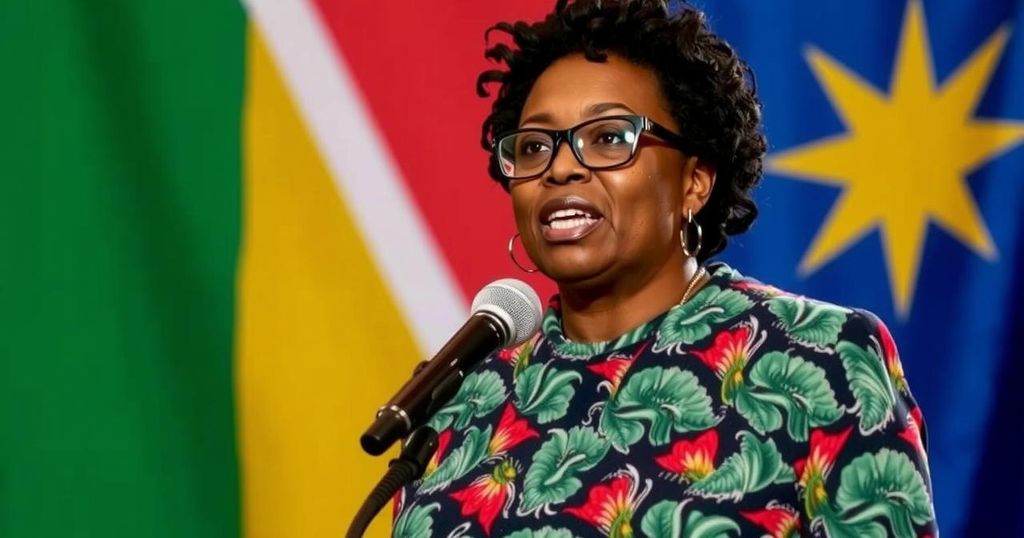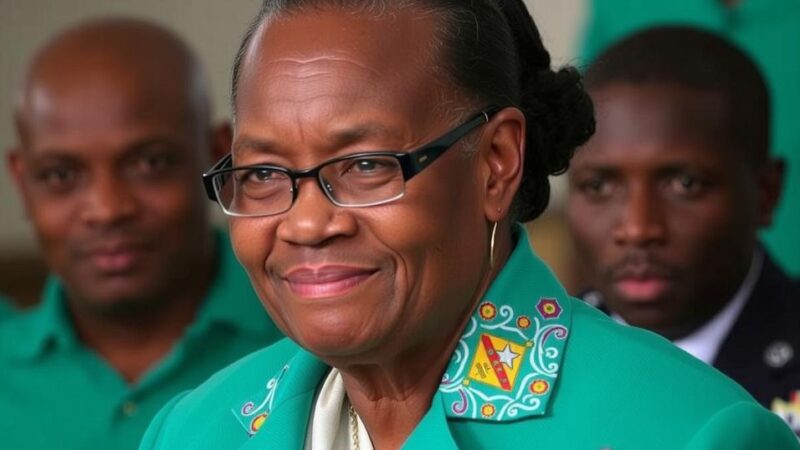Namibia has elected its first female president, Netumbo Nandi-Ndaitwah, who won 57% of the vote, amidst claims of electoral irregularities that opposition parties plan to contest in court. Nandi-Ndaitwah, ascending from vice-presidency, represents a continuation of Swapo’s power but faces critical scrutiny over the electoral process. Her victory contrasts with regional trends of voter backlash against incumbent governments in southern Africa.
Namibia has made history by electing its first female president, Netumbo Nandi-Ndaitwah, who has been declared the victor of the recent presidential elections. With 57% of the vote, she has secured a victory that will extend the ruling Swapo party’s domination, which has persisted for 34 years. Following confirmation of the results, Nandi-Ndaitwah, age 72, remarked, “The Namibian nation has voted for peace and stability.” The election, however, faced significant controversy due to technical issues, including a shortage of ballot papers, which prompted an extended voting period. Opposition parties have voiced their discontent, asserting the irregularities rendered the results illegal and signaling their intent to challenge them in court.
In the elections, Panduleni Itula, who returned to Namibia after years abroad, secured 25.5% of the votes, down from his previous total in 2019. Although Nandi-Ndaitwah’s performance was notable, her party saw a decline to 53% of the parliamentary vote, a drop from 65% five years prior. Despite these challenges, her election presents a stark contrast to the trends observed in neighboring countries, where incumbent parties have faced significant electoral backlash from younger voters disillusioned with longstanding rule. Nandi-Ndaitwah’s steady leadership and diplomatic credentials, unmarred by recent corruption allegations, likely contributed to her electoral success.
This landmark victory is emblematic of a shift in political dynamics within Namibia, as it diverges from the pattern of electoral defeats experienced by ruling parties across Southern Africa. The opposition is poised for legal contention, challenging the integrity of the electoral process and raising questions about the future political landscape in Namibia under its new female leadership, who rose to prominence after serving as vice-president and previously as foreign minister. This election not only represents a significant milestone for gender representation in Namibia but also poses critical implications for the nation’s political evolution in the context of regional trends.
Namibia has been under the governance of the Swapo party since its independence from South African apartheid rule in 1990. Over the decades, Swapo has faced mounting pressures domestically, particularly from younger voters seeking change. The 2023 elections marked a critical moment as Netumbo Nandi-Ndaitwah, who has a storied past as part of the independence movement, attained the presidency amidst allegations of electoral irregularities. This election reflects a broader context of shifting voter support and expectations within Southern Africa, where related nations are witnessing electoral shifts against incumbent governance. Nandi-Ndaitwah’s ascendance as a female leader is particularly noteworthy in a region where powerful liberation movements often struggle to remain relevant.
The election of Netumbo Nandi-Ndaitwah as Namibia’s first female president represents a notable milestone, not only for gender representation but also for the ruling Swapo party’s continued dominance in an evolving political landscape. Despite her victory, the election has been marred by controversy and challenges from opposition parties, highlighting critical issues surrounding electoral integrity in Namibia. As she embarks on her presidency, Nandi-Ndaitwah’s ability to navigate these challenges and address the concerns of her electorate will significantly shape both her legacy and the future of Namibian politics.
Original Source: www.theguardian.com







